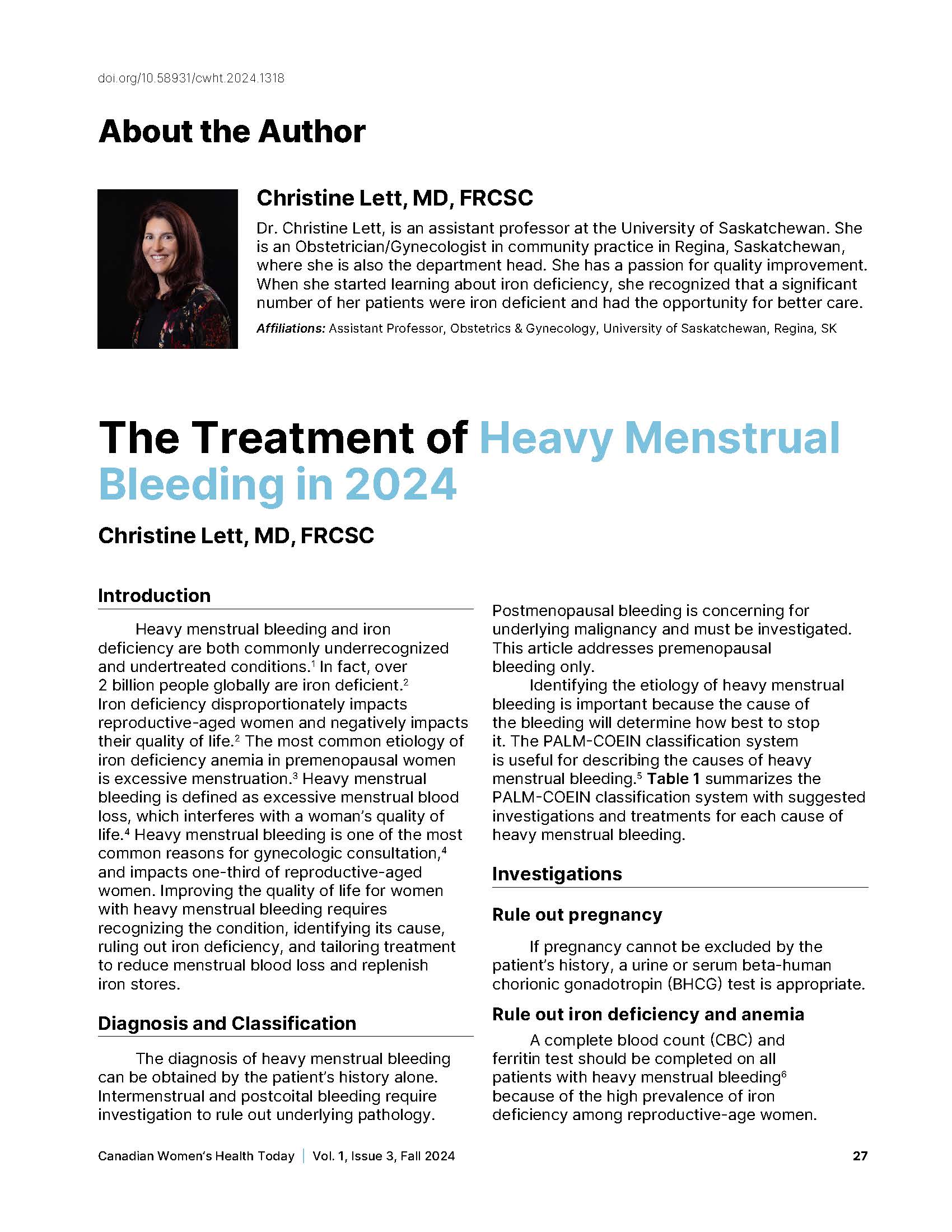The Treatment of Heavy Menstrual Bleeding in 2024
DOI:
https://doi.org/10.58931/cwht.2024.1318Abstract
Heavy menstrual bleeding and iron deficiency are both commonly underrecognized and undertreated conditions. In fact, over 2 billion people globally are iron deficient. Iron deficiency disproportionately impacts reproductive-aged women and negatively impacts their quality of life. The most common etiology of iron deficiency anemia in premenopausal women is excessive menstruation. Heavy menstrual bleeding is defined as excessive menstrual blood loss, which interferes with a woman’s quality of life. Heavy menstrual bleeding is one of the most common reasons for gynecologic consultation, and impacts one-third of reproductive-aged women. Improving the quality of life for women with heavy menstrual bleeding requires recognizing the condition, identifying its cause, ruling out iron deficiency, and tailoring treatment to reduce menstrual blood loss and replenish iron stores.
References
Petraglia F, Dolmans MM. Iron deficiency anemia: impact on women’s reproductive health. Fertil Steril. 2022;118(4):605-606. doi:10.1016/j.fertnstert.2022.08.850
World Health Organization. The urgent need to implement patient blood management: policy brief. Geneva: World Health Organization; 2021 [updated 10 October 2021]. Available from: https://www.who.int/publications/i/item/9789240035744.
Dugan C, MacLean B, Cabolis K, Abeysiri S, Khong A, Sajic M, et al. The misogyny of iron deficiency. Anaesthesia. 2021;76 Suppl 4:56-62. doi:10.1111/anae.15432
National Institute for Health and Care Excellence (NICE). Heavy menstrual bleeding: assessment and management. NICE guideline [NG88] UK: NICE; 2018 [updated 24 May 2021]. Available from: https://www.nice.org.uk/guidance/ng88.
Munro MG, Critchley HO, Broder MS, Fraser IS. FIGO classification system (PALM-COEIN) for causes of abnormal uterine bleeding in nongravid women of reproductive age. Int J Gynaecol Obstet. 2011;113(1):3-13. doi:10.1016/j.ijgo.2010.11.011
Mansour D, Hofmann A, Gemzell-Danielsson K. A review of clinical guidelines on the management of iron deficiency and iron-deficiency anemia in women with heavy menstrual bleeding. Adv Ther. 2021;38(1):201-225. doi:10.1007/s12325-020-01564-y
McLean E, Cogswell M, Egli I, Wojdyla D, de Benoist B. Worldwide prevalence of anaemia, WHO Vitamin and Mineral Nutrition Information System, 1993-2005. Public Health Nutr. 2009;12(4):444-454. doi:10.1017/s1368980008002401
Muñoz M, Acheson AG, Auerbach M, Besser M, Habler O, Kehlet H, et al. International consensus statement on the peri-operative management of anaemia and iron deficiency. Anaesthesia. 2017;72(2):233-247. doi:10.1111/anae.13773
Singh S, Best C, Dunn S, Leyland N, Wolfman WL. No. 292-abnormal uterine bleeding in pre-menopausal women. J Obstet Gynaecol Can. 2018;40(5):e391-e415. doi:10.1016/j.jogc.2018.03.007
Practice bulletin no. 128: diagnosis of abnormal uterine bleeding in reproductive-aged women. Obstet Gynecol. 2012;120(1):197-206. doi:10.1097/AOG.0b013e318262e320
Cartier S, Mayrand MH, Gougeon F, Simard-Émond L. Endometrial biopsy in low-risk women: are we over-investigating? J Obstet Gynaecol Can. 2022;44(10):1097-1101. doi:10.1016/j.jogc.2022.05.010
Hew S, Goss K. AGA Clinical Practice Guidelines on the Gastrointestinal Evaluation of Iron Deficiency Anemia. Gastroenterology. 2021;160(7):2616. doi:10.1053/j.gastro.2020.10.064
Demers C, Derzko C, David M, Douglas J. No. 163-gynaecological and obstetric management of women with inherited bleeding disorders. J Obstet Gynaecol Can. 2018;40(2):e91-e103. doi:10.1016/j.jogc.2017.11.036
Sandoz Canada Inc. Product Monograph. Sandoz Canada Inc. Boucherville, QC2022. p. 26. Avaliable from: https://pdf.hres.ca/dpd_pm/00066203.PDF.
Gayet-Ageron A, Prieto-Merino D, Ker K, Shakur H, Ageron FX, Roberts I. Effect of treatment delay on the effectiveness and safety of antifibrinolytics in acute severe haemorrhage: a meta-analysis of individual patient-level data from 40 138 bleeding patients. Lancet. 2018;391(10116):125-132. doi:10.1016/s0140-6736(17)32455-8
HALT-IT Trial Collaborators. Effects of a high-dose 24-h infusion of tranexamic acid on death and thromboembolic events in patients with acute gastrointestinal bleeding (HALT-IT): an international randomised, double-blind, placebo-controlled trial. Lancet. 2020;395(10241):1927-1936. doi:10.1016/s0140-6736(20)30848-5
Meaidi A, Mørch L, Torp-Pedersen C, Lidegaard O. Oral tranexamic acid and thrombosis risk in women. EClinicalMedicine. 2021;35:100882. doi:10.1016/j.eclinm.2021.100882
Sundström A, Seaman H, Kieler H, Alfredsson L. The risk of venous thromboembolism associated with the use of tranexamic acid and other drugs used to treat menorrhagia: a case-control study using the General Practice Research Database. Bjog. 2009;116(1):91-97. doi:10.1111/j.1471-0528.2008.01926.x
Nanavaty D, Sanghvi A, Patel N, Singh S, Devarakonda PK, Manoharan S, et al. Abstract 581: Impact of iron deficiency anemia on venous thromboembolic diseases: a national inpatient sample analysis. Arteriosclerosis, Thrombosis, and Vascular Biology. 2023;43(Suppl_1):A581-A581. doi:doi:10.1161/atvb.43.suppl_1.581
Iacobellis G, Iacobellis G. Combined treatment with tranexamic acid and oral contraceptive pill causes coronary ulcerated plaque and acute myocardial infarction. Cardiovasc Drugs Ther. 2004;18(3):239-240. doi:10.1023/B:CARD.0000033646.21346.e4
Relke N, Chornenki NLJ, Sholzberg M. Tranexamic acid evidence and controversies: an illustrated review. Res Pract Thromb Haemost. 2021;5(5):e12546. doi:10.1002/rth2.12546
Effect of early tranexamic acid administration on mortality, hysterectomy, and other morbidities in women with post-partum haemorrhage (WOMAN): an international, randomised, double-blind, placebo-controlled trial. Lancet. 2017;389(10084):2105-2116. doi:10.1016/s0140-6736(17)30638-4
Thurston J, Murji A, Scattolon S, Wolfman W, Kives S, Sanders A, et al. No. 377-hysterectomy for benign gynaecologic indications. J Obstet Gynaecol Can. 2019;41(4):543-557. doi:10.1016/j.jogc.2018.12.006
Nelson G, Altman AD, Nick A, Meyer LA, Ramirez PT, Achtari C, et al. Guidelines for pre- and intra-operative care in gynecologic/oncology surgery: Enhanced Recovery After Surgery (ERAS®) Society recommendations--Part I. Gynecol Oncol. 2016;140(2):313-322. doi:10.1016/j.ygyno.2015.11.015
Vilos GA, Allaire C, Laberge PY, Leyland N. The management of uterine leiomyomas. J Obstet Gynaecol Can. 2015;37(2):157-178. doi:10.1016/s1701-2163(15)30338-8
Camaschella C. Iron deficiency. Blood. 2019;133(1):30-39. doi:10.1182/blood-2018-05-815944
Li N, Zhao G, Wu W, Zhang M, Liu W, Chen Q, et al. The efficacy and safety of vitamin C for iron supplementation in adult patients with iron deficiency anemia: a randomized clinical trial. JAMA Netw Open. 2020;3(11):e2023644. doi:10.1001/jamanetworkopen.2020.23644
Pfizer Canada. Product Monograph. Monoferric: Pfizer Canada ULC. Kirkland (Québec) Canada; 2022. p. 40. Avaliable from: https://pdf.hres.ca/dpd_pm/00068101.PDF
Vifor (International) Inc. Product Monograph. Ferinject. CSL Behring Canada, Inc. Ottawa, Ontario: CSL Behring Canada, Inc; 2024. p. 36. Available from: https://pdf.hres.ca/dpd_pm/00076112.PDF.

